INVERSION AND CONVERSION...
 Bigg, the "troubled tough guy" from East Overshoe, asked:
Bigg, the "troubled tough guy" from East Overshoe, asked:I would like to ask to what you attribute your religious faith. Is it your upbringing, a conversion experience... What led you to the faith you have today? I am sincerely interested, and hope I cause no offense.
Rest assured, no offense is caused or taken. As it has now entered the conversations around my coming to grips with being a gay man, it is a topic long overdue, even BEFORE the weeks between promising to post something and actually getting around to doing it.
As anyone who has been through the Sea recently can tell, I have had other things on my mind, first trying to find comfort in the number of people who had committed themselves to staying in their marriages, and then finding ghastly symmetry in watching all those commitments come up against what I would call the hard facts of being queer.
The truly ghastly aspect is how this “coming up” against our “coming out” all seems to be happening in lock-step, although I did notice, once I started blogging, that most of the blogs I was reading had started around the same time, so maybe there is just some inner clock: come out, blog about it, cheer up, then lose it all… But I digress.
I am not sure whether this really addresses Bigg's questions, or whether it is simply too long for its own good. Either way, here it is:
To what do I attribute my religious faith?
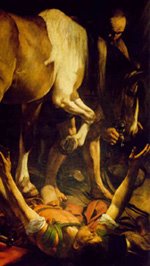 I would say that I was converted by two things, firstly the witness of the flesh and then the witness of the spirit. That is “internal code,” and the “witness of the flesh” means simply the force of lives lived that bear witness to something greater than self; I guess you might enter that under your heading of “upbringing”. The witness of the spirit is force of intellect; I have always lived in my head [how many times have I trotted that one out at Sea?] and for me, the leap that I eventually made to make peace between what I had absorbed growing up and what I had been taught I believed, or ought to believe, was only possible because I could find an intellectual justification for it. Rather amusing, when you consider that the Egyptian darkness I was seeking a way out of was intellectualism.
I would say that I was converted by two things, firstly the witness of the flesh and then the witness of the spirit. That is “internal code,” and the “witness of the flesh” means simply the force of lives lived that bear witness to something greater than self; I guess you might enter that under your heading of “upbringing”. The witness of the spirit is force of intellect; I have always lived in my head [how many times have I trotted that one out at Sea?] and for me, the leap that I eventually made to make peace between what I had absorbed growing up and what I had been taught I believed, or ought to believe, was only possible because I could find an intellectual justification for it. Rather amusing, when you consider that the Egyptian darkness I was seeking a way out of was intellectualism.The Witness of the Flesh:
My grandparents were an enormous presence in my life; I know several “religious” men who had close relationships to their grandmothers, so maybe in a generation or two, there won’t be any of us --- I was already an oddball for knowing and loving my grandparents in my own generation.
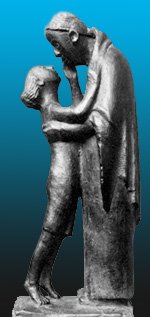 My mother’s parents took her in when she left her husband and came home with two small boys, so they were a constant in my life from the beginning. My adopted father’s parents became more of a presence after their deaths, as I began to deal with the wonderful, terrible life that they had shared. They, and my parents, were all people of abiding faith, and I would go so far as to say that they were all people of different faiths, in one way or another: my mother’s parents might well have divorced over my grandmother’s conversion to Catholicism if she hadn’t shown up on their doorstep.
My mother’s parents took her in when she left her husband and came home with two small boys, so they were a constant in my life from the beginning. My adopted father’s parents became more of a presence after their deaths, as I began to deal with the wonderful, terrible life that they had shared. They, and my parents, were all people of abiding faith, and I would go so far as to say that they were all people of different faiths, in one way or another: my mother’s parents might well have divorced over my grandmother’s conversion to Catholicism if she hadn’t shown up on their doorstep.I believe that one of the things that we do as human beings is to make peace between people who can or could not make peace themselves, and this is particularly true of conflicts that marked us as children and were unresolved at the time of the combatants’ deaths. My grandmother was a lay member of a Benedictine order, and wanted nothing more than to become a full member; the abbess wisely said that she was already a member of another community, to which she owed allegiance. My grandfather viewed the abbey as his “natural born” enemy until my grandmother died, at which point he suddenly discovered that the Benedictines were the other people who had known her most intimately and missed her most, aside from himself — “natural born” friends, as it were. And he not only made his peace with the abbey, but came to depend on her friends there.
So part of me is “programmed” to seek resolution of conflict across religious lines. There are similar fault lines in my family around Judaism and Christianity, and the “scandal” that the gospel remains to the Jews, even to the liberated liberal assimilated Jews of Germany then and America now.
One of my earliest memories is of a night my Catholic grandmother came to baby-sit me when everyone else had gone out; on putting me to bed and saying that we should pray, she discovered that I did not know the Lord’s prayer. Her reaction was not dramatic or emotional, but she taught it to me then and there, until I could say it myself, or at least that is what I remember.
So there was a certain amount of religion in the air and in the water, as they say. My parents were both members of the local Congregational church, but the year they married [and I acquired not only a father but many siblings], we moved away. They never found a church as congenial, and we simply stopped going to church. So for me, religion was never bound to the experience of church, at least not at that point.
The Witness of the Spirit:
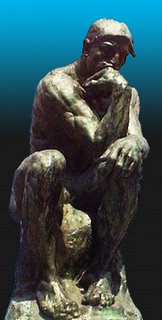 I went to schools where the unspoken religion was an idolization of the intellect, as my children have attended schools where the unspoken religions are sports and college admissions. Over time, the dissonance between that idolization and what I had absorbed from the lives and choices of my parents and grandparents, and their open response to God’s unpredictable calls in life, continued to grow. At twelve, I briefly attended a school that required mid-week church attendance, and in the best donkey tradition, I made a vow never to let a word cross my lips that I could not in good conscience utter. What I had not reckoned with was the fact that as a result, I had to struggle through the liturgy word by word, to find out what I did in fact object to. By the end of the year, I had found to my surprise that I did not really take exception to anything. No one could have been more surprised than I was. A few years later, I lived with a cousin who was an Episcopal priest, and attended church as part of family solidarity; if his Presbyterian wife could do it, I could do no less.
I went to schools where the unspoken religion was an idolization of the intellect, as my children have attended schools where the unspoken religions are sports and college admissions. Over time, the dissonance between that idolization and what I had absorbed from the lives and choices of my parents and grandparents, and their open response to God’s unpredictable calls in life, continued to grow. At twelve, I briefly attended a school that required mid-week church attendance, and in the best donkey tradition, I made a vow never to let a word cross my lips that I could not in good conscience utter. What I had not reckoned with was the fact that as a result, I had to struggle through the liturgy word by word, to find out what I did in fact object to. By the end of the year, I had found to my surprise that I did not really take exception to anything. No one could have been more surprised than I was. A few years later, I lived with a cousin who was an Episcopal priest, and attended church as part of family solidarity; if his Presbyterian wife could do it, I could do no less.Those years left traces, but I was sure that I had left it all behind me. Then, seven years after my Episcopal immersion, a chance encounter with a Catholic writer’s widow led me to her husband’s books, explications of [small "o"] orthodox theology for grown-up lay people written without any of the baggage of theological language. His run-in with the Roman Church brought him the support of one true friend, and the two of them became my twin guides in the dark wood of my college years; from one I learned that we all live by faith of some kind, even if it is as slight as the faith that flicking a toggle switch on the wall will turn on a light in the ceiling, and from the other I began to understand what living in a particular faith might mean.
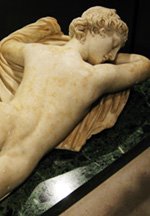 When I got to college, I was “out” to myself and anybody with eyes in their head, having finally admitted, even to one of my sisters, that I had been helplessly in love with a straight friend in high school. While I remained a virgin until I was 21, I had at that point eight years of an overactive imagination behind me. Once across the line, I was, in the dreadful terms we still use to describe something so utterly intimate and emotional, “an active bisexual.” However, when I showed up for dinner at my dorm with my then girlfriend, one of the frequently visiting faculty said in genuine surprise, “The Troll with a woman?”. It had never really occurred to me that things were that obvious. But maybe the rest of the world knew something I didn’t; it often seems to work that way.
When I got to college, I was “out” to myself and anybody with eyes in their head, having finally admitted, even to one of my sisters, that I had been helplessly in love with a straight friend in high school. While I remained a virgin until I was 21, I had at that point eight years of an overactive imagination behind me. Once across the line, I was, in the dreadful terms we still use to describe something so utterly intimate and emotional, “an active bisexual.” However, when I showed up for dinner at my dorm with my then girlfriend, one of the frequently visiting faculty said in genuine surprise, “The Troll with a woman?”. It had never really occurred to me that things were that obvious. But maybe the rest of the world knew something I didn’t; it often seems to work that way.My sexual experience before marriage was not great, especially considering that we are talking about the 1970’s; I think I had slept with three men and four women, most of the encounters one-night stands that ended friendships I treasured, with the exception of one two-week summer-job affair with an older man. I had every intention of remaining bisexual; I knew I wanted a family, and I knew I wanted sex with men… and had sort of decided that an open marriage to a bi woman would solve my “problem”, if not the problem that I seemed consistently to desire sex with men but enjoy sex with women.
After graduating from college, I wangled an invitation which I thought meant a chance to work in publishing in Europe; my hosts had no idea that I came with hopes of employment. Despite their generous hospitality, the dashing of my hopes and the inability to admit defeat and go home [or accomplish much of anything else] plunged me into a despairing questioning of everything I had thought and done in the last five to ten years, exposing the unbearable tension between what I had been “shown” and what I had been taught to believe.
 Augustine writes in his Confessions that conversion may appear to be an event of one moment, but that the "moment" is merely the inbreaking of awareness: the moment has been long in preparation, and the "conversion" is a process that may take as long to come to fruition. That pretty much says it for me.
Augustine writes in his Confessions that conversion may appear to be an event of one moment, but that the "moment" is merely the inbreaking of awareness: the moment has been long in preparation, and the "conversion" is a process that may take as long to come to fruition. That pretty much says it for me.I saw that the seeds of this moment had actually been planted ten years earlier, when I began to confront the liturgy that had been forced on me; my reading of my twin gurus had provided the light and water that had allowed the seed to grow, and it was there in my “dark night of the soul” that the seed came to flower.
Enough of what I read resonated with my own experience that I was willing to accept the rest of it “on faith”. This is where the story gets complicated, because together, these two teachers, whose works had come to me after they themselves were dead and gone, quite simply saved my life: first in my moment of spiritual crisis, and later by keeping me from a life of “sin”. In my eagerness to live a “Christian” life, I embraced a kind of faith in the law which was not only exceedingly odd for a Protestant, but which my gurus had specifically rejected to pursue the free life of the spirit. But how I could have survived my first five years in New York City without some kind of curb, I cannot imagine. These were the heady years that bred the plague, and without my narrow view of life, I might well be dead today. But my embrace also sowed the seed of my current crisis, right from the start. Forgive me if I still think alive is better.
Both of these gurus of mine were born in the 19th century, the persecuted Catholic not long after my great-grand-mother, in 1879; but years do not define the spirit as much as we think they do, and the Catholic definitely lacked the judgmental vigor of his younger friend, a Protestant who met him on his way into the church, just as his new friend was being shown out… It was the Protestant whose homophobia I internalized as my inner authority.
In his defense I have to say that he was homophobic and sexist almost in spite of himself; he had seen the promised land beyond the world he grew up in, but seemed unable to enter it himself. It has taken me years to see that no man can act as complete authority for another, and to act as if he could is to kill the spirit. In fact it might even be the “sin against the Holy Spirit” which so many churchmen have been so sure they could define. In the meantime, I have maintained straddling intellectual positions that resemble nothing so much as the tortured positions I maintained before my “conversion experience.” That experience suddenly begins to look like a very lengthy process indeed, though I would have told you at any point that I was living in liberty.
I cannot emphasize strongly enough that it was not my gurus’ direction, but my own lack of faith, that led me to try to live by the law, as I understood it. It is in part a question of the pendulum having swung so far toward “anything goes” that it had to swing back pretty far, if not quite as far as “nothing goes”. Perhaps what I am suffering is only the latest oscillation, and I am headed for a place where the pendulum at last comes to rest – I would like to think so. [Nate has said that his pendulum had swung so far into “straight” for so long, that it now was at the “gay” end of the arc for the foreseeable future. That rings true for me as well, though it remains a theoretical truth.]
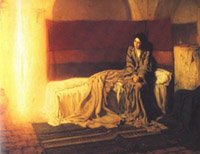 The "twins" themselves took the gospel at face value, not in the sense that they would join those benighted Christians sifting the soil of Mt. Ararat for shreds of the ark, but in the sense of Gabriel’s reply to Mary when she questions the annunciation: “with God nothing is impossible”. Another example might be their view that the creation of the state of Israel was the prophesied “conversion of the Jews” from permanent outsiders in a world of many “nations” to one more nation among many, and a secular one at that. There are still groups today who labor mightily, soul by soul, to wrest Jews from Judaism, which shows a profoundly differing approach to truth, revelation, and the meaning of prophesy. One of my favorite quotes, and from the Protestant, is that in the Christian tradition, the fulfillment of prophesy is NEVER what was expected.
The "twins" themselves took the gospel at face value, not in the sense that they would join those benighted Christians sifting the soil of Mt. Ararat for shreds of the ark, but in the sense of Gabriel’s reply to Mary when she questions the annunciation: “with God nothing is impossible”. Another example might be their view that the creation of the state of Israel was the prophesied “conversion of the Jews” from permanent outsiders in a world of many “nations” to one more nation among many, and a secular one at that. There are still groups today who labor mightily, soul by soul, to wrest Jews from Judaism, which shows a profoundly differing approach to truth, revelation, and the meaning of prophesy. One of my favorite quotes, and from the Protestant, is that in the Christian tradition, the fulfillment of prophesy is NEVER what was expected.The last century has seen phenomenal things done by those who took the gospel at face value, whether we talk about “men of action” like Dorothy Day, Mother Teresa, Dietrich Bonhoeffer and Helmuth von Moltke, or seers like Bill Stringfellow. And the strange and wonderful thing is that while they might not have agreed on much, there they all are, doing something never done before so that we might see that creation goes on around us every day. For we are created, new institutions are founded in the spirit, every day; we are redeemed each day, as selfless people sacrifice their present for the sake of the future; and we are comforted each day, as connections are made between the lost and the seekers, as peace is made where war has raged, as new calls inspire the best among us to “live tomorrow’s life today,” as the hymn says.
It is not so much a question of how much scripture you can accept, and that one answer then answering everything else, as how much you are willing to accept scripture, and see what unexpected directions it leads you in. We are faced today with the very clear choice of being judged by scripture or judging it ourselves. There are enough people, there have been enough people for centuries, only too ready to judge the tradition that gave us the world we live in; what
 is perhaps new and characteristic of our time, is the number of them who also consider themselves the guardians of that tradition. Bishop Spong [he of the square pants and hip views] is ready to jettison anything in order to accommodate his own reason, and he is hardly alone. And God knows the numbers of those who think they know what scripture promises for everyone else has always been high. But this still small pair of voices says: it is all true, and the question is, what happens when you act on that?
is perhaps new and characteristic of our time, is the number of them who also consider themselves the guardians of that tradition. Bishop Spong [he of the square pants and hip views] is ready to jettison anything in order to accommodate his own reason, and he is hardly alone. And God knows the numbers of those who think they know what scripture promises for everyone else has always been high. But this still small pair of voices says: it is all true, and the question is, what happens when you act on that?What led you to the faith you have today?
The Witness of the Spirit II:
My attempt to live by the law, and call it "living in the spirit," finally foundered on the suffering it caused my already long-suffering wife; some seven years after picking up that particular cross, I found that I could not continue to carry it if it meant binding another, unwilling soul to it as well. That might even be the moment where my present position first began to germinate. It was also around the time that I began to realize that, conversion or no conversion, I was still attracted to men. Over the next seven or eight years, every trip out of town brought me back face-to-face with my “shadow side”, but the last and remaining vestige of the law was the vow I had taken in front of so many of my family and friends, and I hid behind it. Odd, as it was perhaps the one thing I had done in perfect freedom without regard to “law.”
 Then came the winter of my discontent, in which Tom of Finland [or as my delightfully innocent therapist has it, "Tim the Swede"] raised his ugly head and could no longer be denied. My mantra became “no more fool’s paradise”, though I soon found that there was a limit to what I could live with, however much more I might come to know. [See Uncle Tom’s Cabin and You Say Tagame…] By now some twenty years had gone by since I had set out to lay aside half of my self, and the fact that it had refused to be laid aside was becoming inescapable. I had worked my way around to the position that orientation was something no one could help, but that we all bore responsibility for how we chose to live. [While it no longer means the same thing to me, it still makes sense on some level.]
Then came the winter of my discontent, in which Tom of Finland [or as my delightfully innocent therapist has it, "Tim the Swede"] raised his ugly head and could no longer be denied. My mantra became “no more fool’s paradise”, though I soon found that there was a limit to what I could live with, however much more I might come to know. [See Uncle Tom’s Cabin and You Say Tagame…] By now some twenty years had gone by since I had set out to lay aside half of my self, and the fact that it had refused to be laid aside was becoming inescapable. I had worked my way around to the position that orientation was something no one could help, but that we all bore responsibility for how we chose to live. [While it no longer means the same thing to me, it still makes sense on some level.]A few years later, I attended the annual meeting of our UCC “diocese,” at which the issue of human sexuality was the burning and divisive issue [how glad I am that we did not have broaden the debate to include animal sexuality...]. This was where I heard all the ghastly language with which people on both sides of the ideological divide used to demonize their counterparts, and developed my current position of “a pox on both their houses.” But with one conservative’s call for the voice of those who had been saved from a life of “sin” by the power of Christ, I felt for the first time that my own experience was being validated in the general mud-slinging of the so-called “debate.”
You can see in A Month of Sundays how that call slowly revealed to me that while I could no longer side with either wing, my dedication to scripture which I shared with the conservatives had led me almost all the way to the position proclaimed by the liberals, with their conviction that scripture needed to be swept away in the interest of enlightenment. Well, as I said above, “a pox on both their houses.”
 That was some six years ago, and it marked the halfway mark between my embrace of my shadow self and my first attempt to tell my wife that I had to find a way to deal with what that embrace meant, and the current crisis in which we find ourselves. That first attempt had proven so obviously painful that I decided that I could not pursue something that struck so near her heart. Until I found that my own ability to bear suffering had also reached its limit, and I entered the agonizing sweepstakes of our little corner of the world, where the contradictions cry out for some kind of recognition, even if there can be no final resolution without unimaginable suffering.
That was some six years ago, and it marked the halfway mark between my embrace of my shadow self and my first attempt to tell my wife that I had to find a way to deal with what that embrace meant, and the current crisis in which we find ourselves. That first attempt had proven so obviously painful that I decided that I could not pursue something that struck so near her heart. Until I found that my own ability to bear suffering had also reached its limit, and I entered the agonizing sweepstakes of our little corner of the world, where the contradictions cry out for some kind of recognition, even if there can be no final resolution without unimaginable suffering.As I have posted often, the question that torments me is who is to suffer, how long, and why? How can I, how can anyone, say with good conscience that our own suffering requires remedy that entails the suffering of so many others? Yet I find that I have crossed some kind of bridge, and perhaps more than one, since this “issue” rose up again and I found I could no longer live and ignore it.
The first bridge, and the one I can most freely acknowledge, is that I am [to whatever degree] gay, “as queer as a three-dollar bill”, and that no amount of argument, prayer, or self-denial is ever going to change that simple fact. And that I am no longer willing, no longer able, I fear, to remain silent. The only question is how and when to speak the truth, and, of course, to whom. The second bridge is that “coming out” will mean a change in life, whether by design or not, that may make marriage an impossibility, whether or not I decide to act on my acknowledged sexuality.
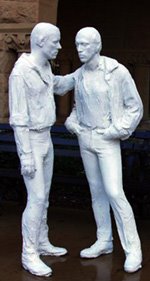 For the real cross I have to bear is that I have no guarantee that coming out will mean a life of “liberation”, especially if it dooms my marriage as it seems to do. I think I can say in all humility that if I do not know whether I can find happiness living as a gay man, the decision that deprives me of nearly all I have held dear these many years is no selfish whim. What I stand to lose is so clearly “everything”, and what I stand to gain, if anything, remains to be seen. But the kingdom of heaven may yet be found in something as small as a mustard seed, like the modicum of respect that living in truth might bring.
For the real cross I have to bear is that I have no guarantee that coming out will mean a life of “liberation”, especially if it dooms my marriage as it seems to do. I think I can say in all humility that if I do not know whether I can find happiness living as a gay man, the decision that deprives me of nearly all I have held dear these many years is no selfish whim. What I stand to lose is so clearly “everything”, and what I stand to gain, if anything, remains to be seen. But the kingdom of heaven may yet be found in something as small as a mustard seed, like the modicum of respect that living in truth might bring.I desire above all else to live in grace AND truth, but can no longer live except in truth. God help me.
Stay with me.
Pray for me.
And keep in touch.

